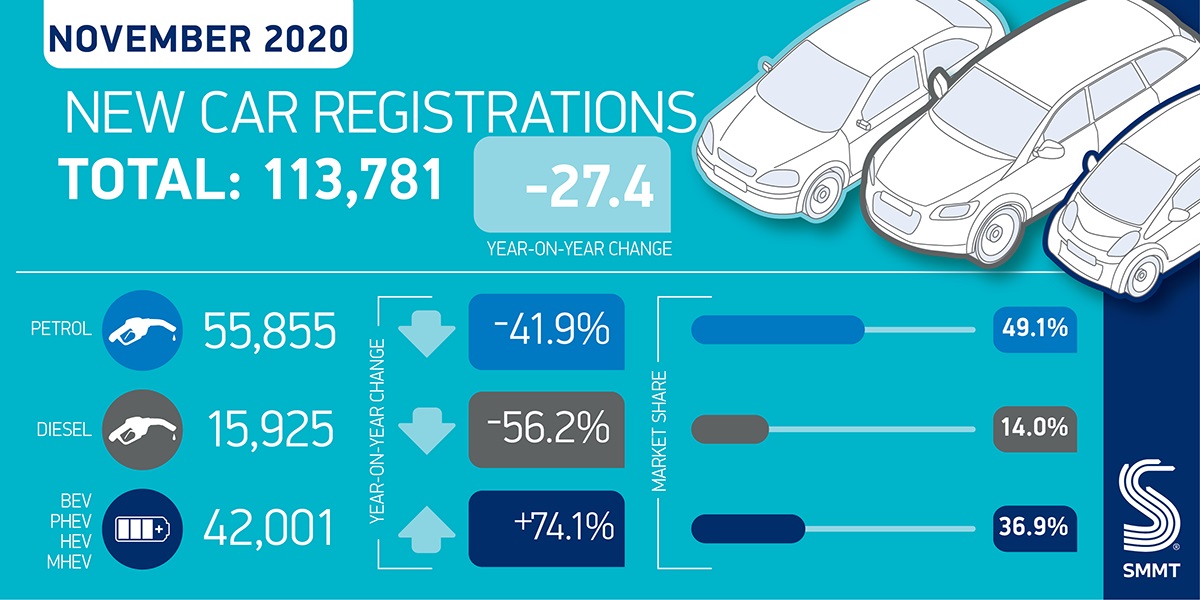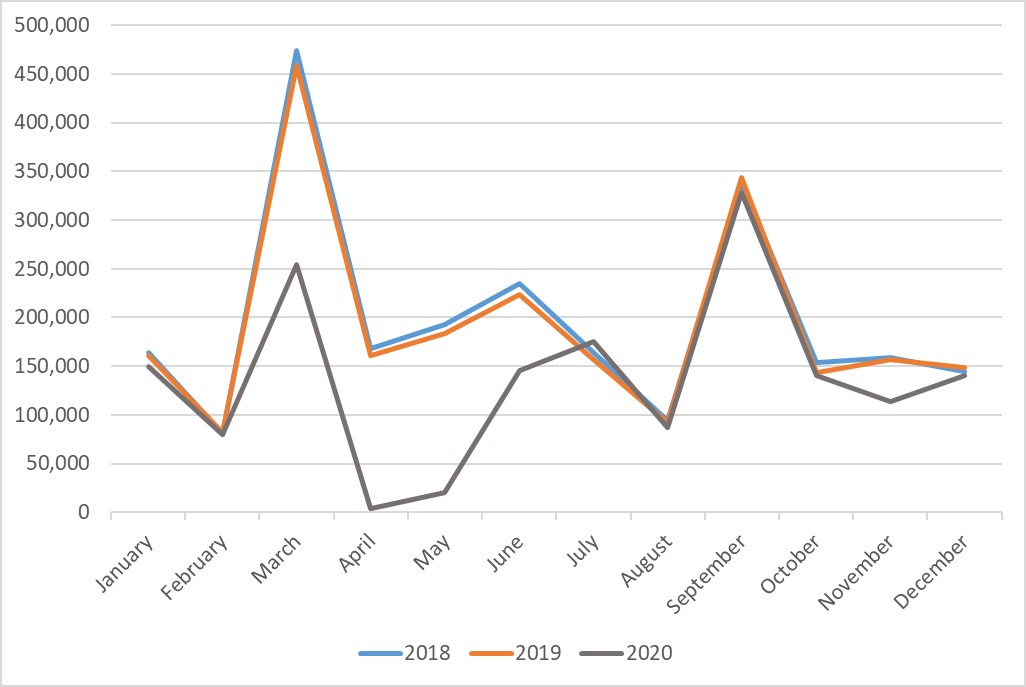UK registrations stall in November as second lockdown takes effect
04 December 2020

4 December 2020
UK new-car registrations fell by 27.4% year-on-year in November, as a second lockdown came into effect, closing dealerships and hampering sales. New data from the Society of Motor Manufacturers and Traders (SMMT) reveals that 42,840 fewer cars joined British roads, resulting in a £1.3 billion (€1.4 billion) revenue hit for the market.
In total, the UK saw 113,781 new-car registrations last month, taking trade back to levels not seen since the 2008 recession. Private demand fell by 32.2%, while registrations by large fleets dropped by 22.1%. While this most recent decline demonstrates the continued impact of COVID-19, the drop was less severe than the one in the UK’s first lockdown which began in March, where registrations fell by 97.3% in April alone.
Fuel type divergence
Positive trends did continue for alternative-fuel cars, with battery-electric vehicles (BEVs) and plug-in hybrid vehicles (PHEVs) increasing their number of registrations, up 122.4% and 76.9% respectively. BEVs enjoyed their third-highest ever monthly market share at 9.1%, with PHEVs also building their share up to 6.8%.
Nearly 37% of the market was held by low-emission fuel types in November, resulting in a year-on-year change of 74.1%. This resulted in a combined total of 18,000 new zero-emission capable cars joining the UK’s roads during the month. Meanwhile, petrol continued to hold on to its market majority at 49.1%, with a year-on-year registrations drop of 41.9%, from 96,166 in November 2019 to 55,855 in the same period this year. Diesel sales fell by 56.2% to 15,925 in November 2020 from 36,329 units in the same period last year, holding on to 14% of the market.
 Source: SMMT
Protective measures in place
November’s partial triumph is the result of manufacturers being better prepared to deal with the pandemic, having already put in place protective measures during the first wave of COVID-19 and the resulting lockdowns, such as click and collect ordering systems with little to no human contact.
′Given the huge contribution that COVID-19-secure showrooms make to the economy and a national recovery, reopening dealerships across most of the UK will help protect jobs in retail and manufacturing and should help stimulate spending,’ the SMMT said.
So far, the automotive sector has been stripped of 663,761 units this year, down 30.7%. This means that some 31,000 cars would need to be registered every working day in December if the market was to climb back to the level expected at the beginning of 2020.
UK new-car registrations, January 2018 to December 2020 (forecast from December 2020)
Source: SMMT
Protective measures in place
November’s partial triumph is the result of manufacturers being better prepared to deal with the pandemic, having already put in place protective measures during the first wave of COVID-19 and the resulting lockdowns, such as click and collect ordering systems with little to no human contact.
′Given the huge contribution that COVID-19-secure showrooms make to the economy and a national recovery, reopening dealerships across most of the UK will help protect jobs in retail and manufacturing and should help stimulate spending,’ the SMMT said.
So far, the automotive sector has been stripped of 663,761 units this year, down 30.7%. This means that some 31,000 cars would need to be registered every working day in December if the market was to climb back to the level expected at the beginning of 2020.
UK new-car registrations, January 2018 to December 2020 (forecast from December 2020)
 Source: SMMT and Autovista Group
′Compared with the spring lockdown, manufacturers, dealers and consumers were all better prepared to adjust to constrained trading conditions,’ said Mike Hawes, SMMT chief executive. ′But with £1.3 billion worth of new car revenue lost in November alone, the importance of showroom trading to the UK economy is evident and we must ensure they remain open in any future COVID-19 restrictions. More positively, with a vaccine now approved, the business and consumer confidence on which this sector depends can only improve, giving the industry more optimism for the turn of the year.’
Now with less than a month to go until the UK leaves the EU, talks over a trade deal look to be reaching a pinnacle moment. In the event of no free-trade agreement between the UK and EU tariffs of 10% could be added to imports and exports. Carmakers have already cautioned their inability to absorb this additional cost, meaning they could tag it onto the price of new cars imported into the country, which will only come to hurt the sector further.
Source: SMMT and Autovista Group
′Compared with the spring lockdown, manufacturers, dealers and consumers were all better prepared to adjust to constrained trading conditions,’ said Mike Hawes, SMMT chief executive. ′But with £1.3 billion worth of new car revenue lost in November alone, the importance of showroom trading to the UK economy is evident and we must ensure they remain open in any future COVID-19 restrictions. More positively, with a vaccine now approved, the business and consumer confidence on which this sector depends can only improve, giving the industry more optimism for the turn of the year.’
Now with less than a month to go until the UK leaves the EU, talks over a trade deal look to be reaching a pinnacle moment. In the event of no free-trade agreement between the UK and EU tariffs of 10% could be added to imports and exports. Carmakers have already cautioned their inability to absorb this additional cost, meaning they could tag it onto the price of new cars imported into the country, which will only come to hurt the sector further.
 Source: SMMT
Protective measures in place
November’s partial triumph is the result of manufacturers being better prepared to deal with the pandemic, having already put in place protective measures during the first wave of COVID-19 and the resulting lockdowns, such as click and collect ordering systems with little to no human contact.
′Given the huge contribution that COVID-19-secure showrooms make to the economy and a national recovery, reopening dealerships across most of the UK will help protect jobs in retail and manufacturing and should help stimulate spending,’ the SMMT said.
So far, the automotive sector has been stripped of 663,761 units this year, down 30.7%. This means that some 31,000 cars would need to be registered every working day in December if the market was to climb back to the level expected at the beginning of 2020.
UK new-car registrations, January 2018 to December 2020 (forecast from December 2020)
Source: SMMT
Protective measures in place
November’s partial triumph is the result of manufacturers being better prepared to deal with the pandemic, having already put in place protective measures during the first wave of COVID-19 and the resulting lockdowns, such as click and collect ordering systems with little to no human contact.
′Given the huge contribution that COVID-19-secure showrooms make to the economy and a national recovery, reopening dealerships across most of the UK will help protect jobs in retail and manufacturing and should help stimulate spending,’ the SMMT said.
So far, the automotive sector has been stripped of 663,761 units this year, down 30.7%. This means that some 31,000 cars would need to be registered every working day in December if the market was to climb back to the level expected at the beginning of 2020.
UK new-car registrations, January 2018 to December 2020 (forecast from December 2020)
 Source: SMMT and Autovista Group
′Compared with the spring lockdown, manufacturers, dealers and consumers were all better prepared to adjust to constrained trading conditions,’ said Mike Hawes, SMMT chief executive. ′But with £1.3 billion worth of new car revenue lost in November alone, the importance of showroom trading to the UK economy is evident and we must ensure they remain open in any future COVID-19 restrictions. More positively, with a vaccine now approved, the business and consumer confidence on which this sector depends can only improve, giving the industry more optimism for the turn of the year.’
Now with less than a month to go until the UK leaves the EU, talks over a trade deal look to be reaching a pinnacle moment. In the event of no free-trade agreement between the UK and EU tariffs of 10% could be added to imports and exports. Carmakers have already cautioned their inability to absorb this additional cost, meaning they could tag it onto the price of new cars imported into the country, which will only come to hurt the sector further.
Source: SMMT and Autovista Group
′Compared with the spring lockdown, manufacturers, dealers and consumers were all better prepared to adjust to constrained trading conditions,’ said Mike Hawes, SMMT chief executive. ′But with £1.3 billion worth of new car revenue lost in November alone, the importance of showroom trading to the UK economy is evident and we must ensure they remain open in any future COVID-19 restrictions. More positively, with a vaccine now approved, the business and consumer confidence on which this sector depends can only improve, giving the industry more optimism for the turn of the year.’
Now with less than a month to go until the UK leaves the EU, talks over a trade deal look to be reaching a pinnacle moment. In the event of no free-trade agreement between the UK and EU tariffs of 10% could be added to imports and exports. Carmakers have already cautioned their inability to absorb this additional cost, meaning they could tag it onto the price of new cars imported into the country, which will only come to hurt the sector further.